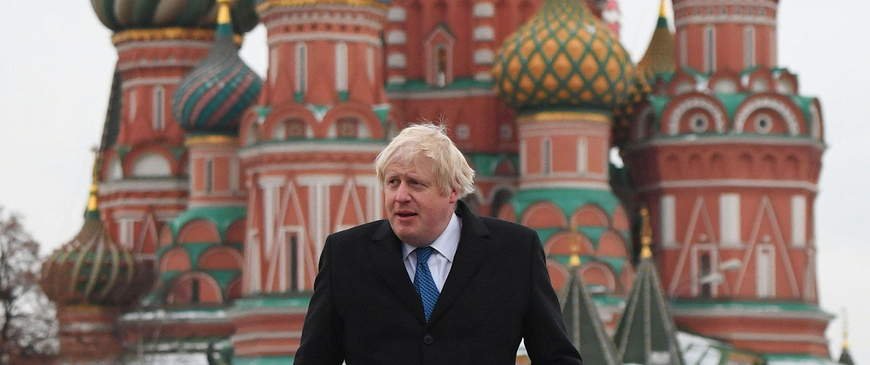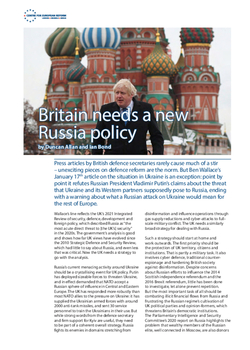
Britain needs a new Russia policy
The British government, once naively optimistic about Russia, has become more hard-nosed in its analysis. It should now do more to pursue a coherent Russia strategy with like-minded countries.
Press articles by British defence secretaries rarely cause much of a stir – unexciting pieces on defence reform are the norm. But Ben Wallace’s January 17th article on the situation in Ukraine is an exception: point by point it refutes Russian President Vladimir Putin’s claims about the threat that Ukraine and its Western partners supposedly pose to Russia, ending with a warning about what a Russian attack on Ukraine would mean for the rest of Europe.
Wallace’s line reflects the UK’s 2021 Integrated Review of security, defence, development and foreign policy, which described Russia as “the most acute direct threat to [the UK’s] security” in the 2020s. The government’s analysis is good and shows how far UK views have evolved since the 2010 Strategic Defence and Security Review, which had little to say about Russia, and even less that was critical. Now the UK needs a strategy to go with the analysis.
Russia’s current menacing activity around Ukraine should be a crystallising event for UK policy. Putin has deployed sizeable forces to threaten Ukraine, and in effect demanded that NATO accept a Russian sphere of influence in Central and Eastern Europe. The UK has responded more robustly than most NATO allies to the pressure on Ukraine: it has supplied the Ukrainian armed forces with around 2000 anti-tank missiles, and sent 30 service personnel to train the Ukrainians in their use. But while strong words from the defence secretary and firm support for Kyiv are useful, they need to be part of a coherent overall strategy. Russia fights its enemies in domains stretching from disinformation and influence operations through gas supply reductions and cyber-attacks to full-scale military conflict. The UK needs a similarly broad strategy for dealing with Russia.
Strong words from the defence secretary and firm support for Kyiv are useful, but they need to be part of a coherent Russia strategy.
Such a strategy should start at home and work outwards. The first priority should be the protection of UK territory, citizens and institutions. That is partly a military task. It also involves cyber defence, traditional counter-espionage and hardening British society against disinformation. Despite concerns about Russian efforts to influence the 2014 Scottish independence referendum and the 2016 Brexit referendum, little has been done to investigate, let alone prevent repetition. But the most important task of all should be combating illicit financial flows from Russia and frustrating the Russian regime’s cultivation of UK political parties and opinion-formers, which threatens Britain’s democratic institutions. The Parliamentary Intelligence and Security Committee’s 2020 report on Russia highlights the problem that wealthy members of the Russian elite, well connected in Moscow, are also donors to British political parties, “with a public profile which positions them to assist Russian influence operations”. The government, however, has done little if anything to tackle the issue – Russian money of uncertain origin is still welcomed with few questions asked.
The second priority should be the security of the Euro-Atlantic area. The UK prides itself on consistently meeting the NATO goal of spending 2 per cent of GDP on defence. The question is whether the government spends its money wisely. It should invest more in forces designed and deployed to deter hostile Russian military activity in the North Atlantic and the mainland of Europe. The UK should also work with the EU and European countries to take the tools of energy blackmail out of Russia’s hands, by reducing dependence on Russian gas.
The third priority should be countering Russian activity that damages UK and Western interests beyond Europe: the Russian state has made use of quasi-private military companies to disrupt Western stabilisation efforts in Libya, the Central African Republic, Mali and elsewhere. At the same time, the UK should not make the mistake of overstretching limited assets in the hope of being a major player in the Middle East or the Indo-Pacific region.
Finally, the UK should not shut the door on the possibility of better relations. Disagreements between London and Moscow will need to be managed through dialogue; and there are still a few issues, such as non-proliferation and counter-terrorism, on which London and Moscow might be able to co-operate. And the UK should continue to promote educational, scientific, sporting, tourism and mutually beneficial trade links with Russia, to underline that the UK’s problems are with the current leadership and its policies, not with the Russian people.
The UK has a number of policy tools to implement its strategy. It has skilled diplomats, some with significant experience of Russia; capable intelligence services (though Russia was a lower priority for them after the end of the Cold War and the rise of the international terrorist threat); and significant if stretched military forces. The UK also has important soft-power tools, including the BBC and British universities; they can be used to reach out to parts of Russian society that government bodies find it hard to make contact with. The UK’s most important asset, however, is its network of allies and partners. On its own, the UK is vulnerable to hostile Russian action; but if it is attacked (as in the attempt to poison the former spy Sergei Skripal in 2018), it can respond more effectively in concert with like-minded states, co-ordinating the imposition of sanctions and other measures.
Brexit, particularly the UK’s decision not to try to negotiate an agreement on foreign, security and defence co-operation as part of the post-withdrawal arrangements, has made some of this co-ordination harder than it need have been. On Russia policy there are sympathetic member-states with which the UK can work to influence EU debates. But Brexit has moved the centre of gravity in the EU towards those member-states who prefer to pursue a softer line with Russia, believing in the teeth of all the evidence that making concessions to Putin will ensure lasting European stability.
The defence secretary has made a valuable contribution to countering Russian disinformation and helping Ukraine. But he should not have to lead the government’s effort to meet the Russian threat, or to co-ordinate with the EU and like-minded governments on sanctions and other measures to deter Russia from invading Ukraine. As foreign secretary, Boris Johnson went to Moscow in 2017 hoping to improve a difficult relationship. He should now accept that no improvement is likely at least as long as Putin and his fellow securocrats are in charge. He should work with EU and NATO governments to limit the damage that the regime can do to European security and prosperity. Johnson and the foreign secretary, Liz Truss, should also be talking to counterparts from countries for whom avoiding confrontation is currently a higher priority than maintaining Ukrainian sovereignty. They should aim to build a Western consensus that compromising core interests is worse than having an adversarial relationship with Russia.
A successful UK strategy for Russia has to be based on realism – about Russia’s strengths, weaknesses and intentions, but also about the UK’s vulnerabilities and its assets.
A successful UK strategy for Russia has to be based on realism – about Russia’s strengths, weaknesses and intentions, but also about the UK’s vulnerabilities and its assets. Johnson and Truss should acknowledge, at least to themselves, that it would be easier for both the UK and the EU to stand up to Russia if they had a more functional foreign policy relationship. Brexit has given the UK greater flexibility to ‘go it alone’ in devising foreign policy; it has not made it any more likely that splendid isolation in Europe will help the government achieve its policy goals, especially when dealing with a ruthless, disruptive actor like Putin.
Duncan Allan is an associate fellow at the Russia and Eurasia programme, Chatham House
Ian Bond is director of foreign policy, Centre for European Reform
This article is adapted from a report by the same authors, 'A new Russia policy for post-Brexit Britain', to be published by Chatham House.


Comments